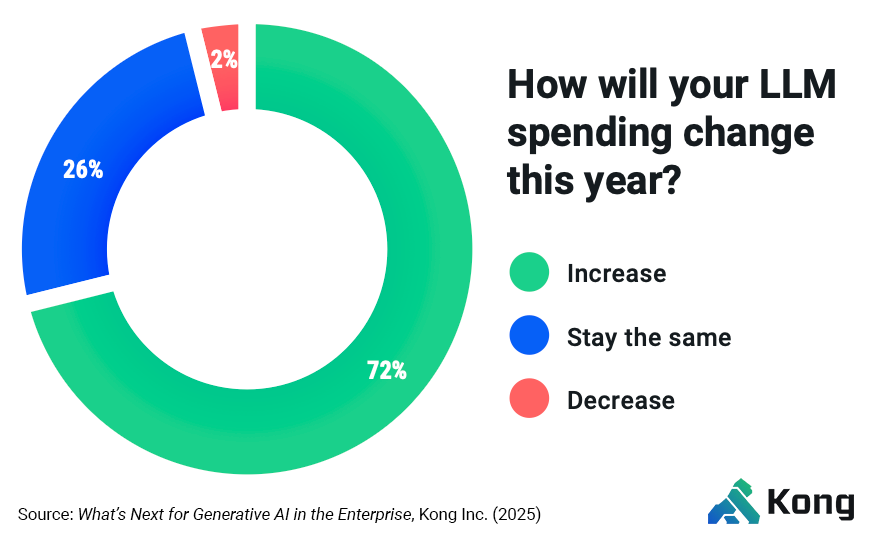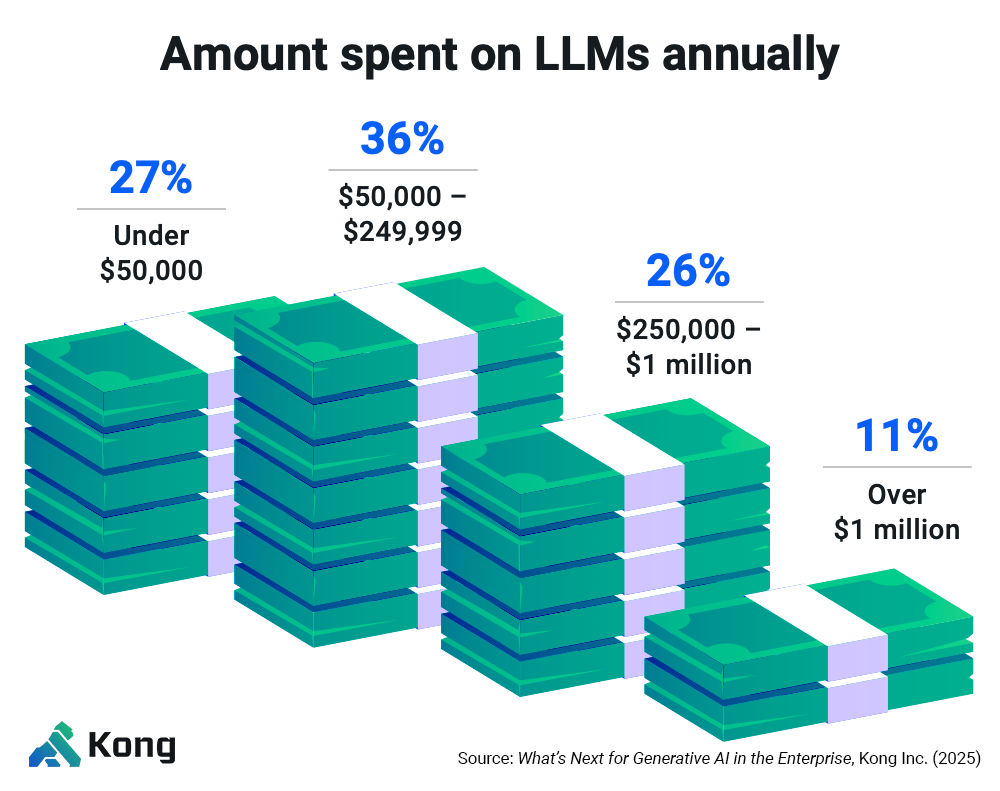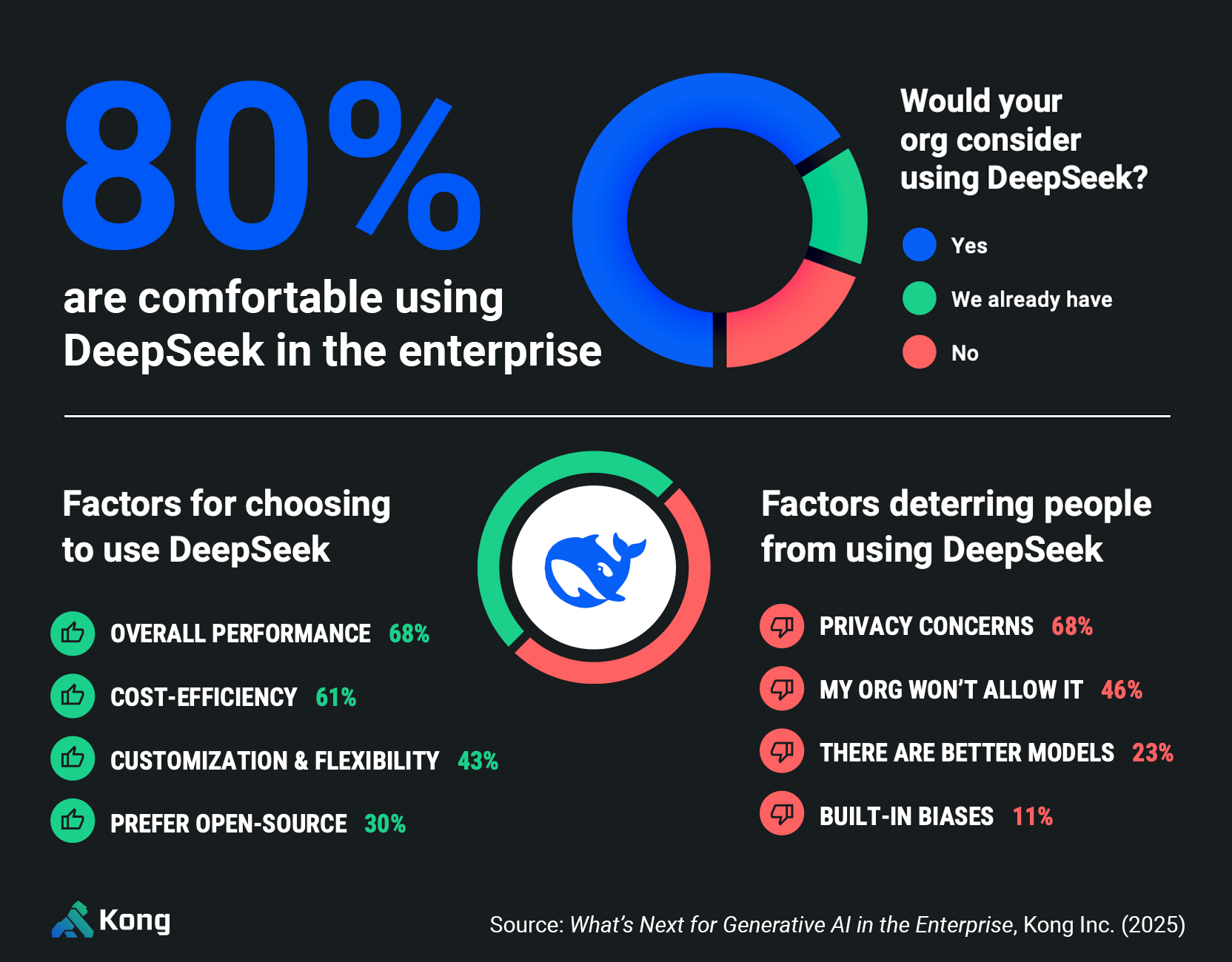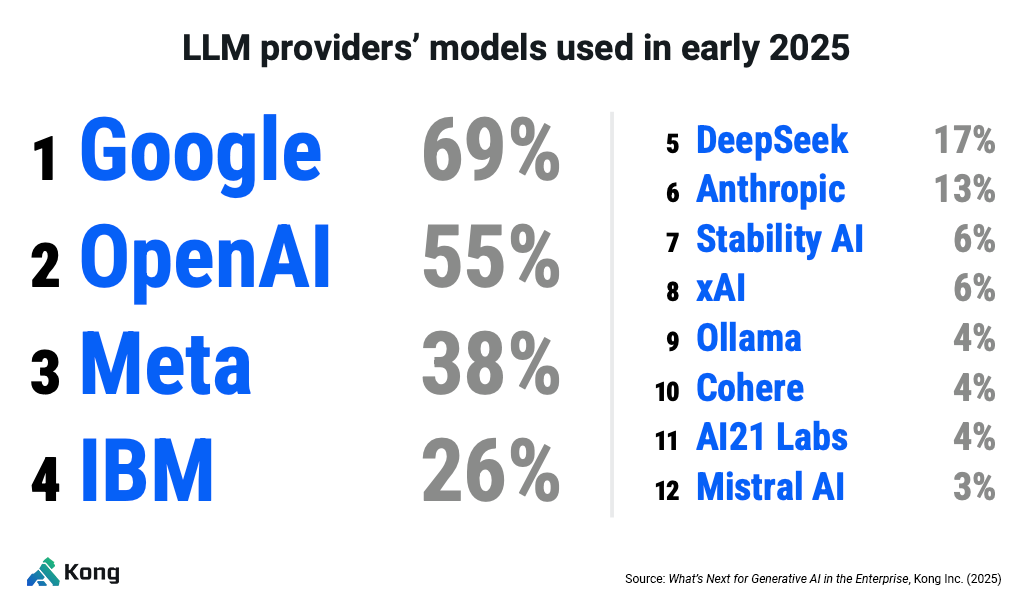Survey Says: Google LLMs See Usage Surge, Most OK with DeepSeek in the Workplace
Enterprise adoption of large language models (LLMs) is surging. According to Gartner, more than 80% of enterprises will have deployed generative AI (GenAI) applications or used GenAI APIs by 2026, up from just 5% in 2023. That stark increase paints a telling picture: LLMs have evolved from a fringe technology to a cornerstone of business development and productivity.

But as with any new technology, competition is fierce. Businesses looking to broaden their digital transformation strategies are bearing down on tough decisions. Which LLM is right for them? How will it impact their data security policies? What are the benefits of open source versus proprietary models?
As the industry grapples with the complexities of the increasingly crowded LLM ecosystem and what it means for the enterprise, Kong initiated research to gather developers' and IT leaders' perspectives on GenAI in 2025. We surveyed 550 Kong users, engineers, and IT decision-makers to gather their professional insights, preferences, and concerns about enterprise LLM adoption.
Here are four other highlights from what we learned.
Want to get the full report? Download your free copy of What’s Next for Generative AI in the Enterprise.
1. LLM spending is going up (and people are already spending plenty)
72% of respondents say they anticipate an increase in their organization’s LLM spending in the year ahead.
What's that look like? For reference, 37% say they're currently spending more than $250,000 USD a year on LLMs, and 73% are already spending over $50,000 annually. But there are potential challenges to that spending, with security and compliance being called out as the biggest potential blockers for LLM adoption.

2. Developers and tech leaders aren't afraid of DeepSeek
DeepSeek, a newer entrant that rocketed onto the stage and gained significant market attention back in January, quickly grabbed the attention of engineers and tech leaders: 17% reported using DeepSeek in the first months of 2025. For comparison, that's more than the 13% who reported using Anthropic models in the same time period.
Despite speculation that geopolitical ties and potential privacy implications could be a hurdle for its adoption in the United States, 80% say they have used or would consider using DeekSeek in their workplace.

3. Google models saw a surge in usage in early 2025
In 2024, survey data showed that OpenAI's models were the most widely used by developers. But in the first quarter of 2025, Google saw a rapid rise in developer usage: 69% of respondents report using Google's models in the first months of the year, while 55% say they used OpenAI models in the same timeframe. Meta and IBM models trail at 38% and 26% respectively.

Are we saying Google Gemini is the most adopted LLM? No! But it does seem to show that Google has driven impressive usage over the past few months.
But still . . . why might more report recently turning to Google models than models from OpenAI — often regarded as the LLM frontrunner? Our hypothesis is a combo of investment, aggressive pricing, and expanded exposure.
Google’s developer ecosystem and established integrations within enterprise environments via Google Cloud and Google Workspace make it easy for teams to expand consumption of Google services. In addition, Gemini was integrated into Google Workspace in late 2024, and Gemini 2.0 dropped in February 2025. So whether you're searching the (now) old-fashioned way or in a Google Doc, Google is using its massive footprint to make Gemini readily accessible.
Given its enormous user base and virtually unlimited resources, we may expect more of a horse race between Google and OpenAI LLMs in the months to come.
4. Most are optimistic about GenAI's impact on their organization and career
Feeling doom and gloom about AI and the future of work? You may be in the minority.
82% report feeling GenAI will have a positive impact on their career outlook and innovation in their organization: 46% say GenAI's biggest impact on their organization will be as a tool for enhancing productivity and innovation, and 36% say it will create new positions or opportunities.
Of course, not everyone has an optimistic outlook. 11% of those surveyed believe GenAI will increase the likelihood of layoffs. But this is a downward trend from our 2024 research, which indicated nearly 20% of developers felt GenAI would increase layoffs.
Interestingly, a small minority (8%) believe GenAI will have little or no impact on their business. This could be skepticism about AI’s ability to deliver real results or the opinion in industries where AI’s influence is still emerging.

What's next for GenAI in the enterprise?
Explore the latest trends, insights, and challenges in enterprise LLM adoption from our survey of 550 Kong users, developers, engineers, and IT leaders. Download your free copy of the full report, What’s Next for Generative AI in the Enterprise.














